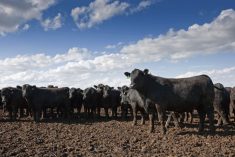CHICAGO (Reuters) — As U.S. grain handlers strain to replenish depleted supply pipelines, some are offering pricing incentives to farmers who so far have been slow to sell much of their freshly harvested corn and soybeans.
A popular move among commercial grain buyers this week was to offer free or discounted “delayed price” contracts, under which farmers give up control of their grain and agree to set a price at a later date — all to entice tight-fisted farmers to move crops into pipeline now.
Livestock producers, ethanol makers, exporters and food processors have been keen to get their hands on newly harvested crops because inventories are razor-thin after last year’s devastating drought slashed yields.
Read Also

U.S. grains: Soybean prices rise as China-U.S. truce assessed
Chicago soybean prices rose on Wednesday, recovering some of the previous session’s losses, as Beijing’s confirmation that it was cutting tariffs on U.S. farm goods put attention back on a trade truce between the countries.
“There is simply no old crop out there, and they are desperate to get grain now,” said Arlan Suderman, senior market analyst with Water Street Solutions in Peoria, Illinois.
“The ethanol industry alone needs over 90 million bushels per week, and the livestock industry needs the same amount. That’s a lot of volume. That stiffens up the competition to get these early bushels,” Suderman said.
The delayed price, or “DP,” contracts allow farmers to benefit if prices eventually rise, and may reduce the costs and risks of storing grain. Growers can defer income until the new tax year and a potential price rally in early 2014.
The risks include a drop in prices, and the possibility that the elevator holding the title to the grain may go bankrupt.
The advantage for buyers is that they get access to bushels of grain that can move into processing channels immediately.
The emergence of incentives — like discounts on DP contracts or grain drying — underscores how a near-term commercial grain shortage persists in some areas, even as U.S. farmers are in the midst of harvesting a record-large corn crop, projected at 13.8 billion bushels, and a sizable 3.1 billion-bushel soybean crop.
This week, such incentives were most common west of the Mississippi River, where the bulk of U.S. ethanol is produced and where growers have ample on-farm storage.
“They have more empty space, their beginning stocks were tighter, and that’s where the ethanol plants are,” said Diana Klemme, vice president of Grain Service Corp. in Atlanta.
“It will take a while for enough of (the crop) to get into the pipeline, to see it ripple to the west and get everyone comfortable,” Klemme said.
With front-month corn futures on the Chicago Board of Trade trading below $4.50 a bushel for the first time in three years, farmers have been unwilling to sell much of their new crop, opting to store the grain instead and wait for a rally.
“You’ve got a lot of bin space from the drought last year. Bottom line, you are going to see a lot of bin doors slam shut here,” said Mike Zuzolo, president of Global Commodity Analytics in Atchison, Kansas.
Some locations were offering free DP on soybeans, too, reflecting slow farmer sales despite an inverse in CBOT futures, with premium prices for prompt delivery. However, elevator merchants and soy processors noted a pick-up in soybean movement this week as farmers cashed in on the front-end premium.
CBOT nearby November soybean futures were trading at midsession Thursday at $12.90 a bushel, a three-cent premium to the January contract and a 40-cent premium to July.
The offers of free DP will be fleeting, brokers say. Such incentives have already disappeared for corn in the eastern half of the Midwest, where harvest is in full swing and pipelines are filling back up, depressing cash prices.
“In Ohio, where the harvest is further along and the yields are spectacular, you see the basis weakening because they have got enough,” Klemme said.














